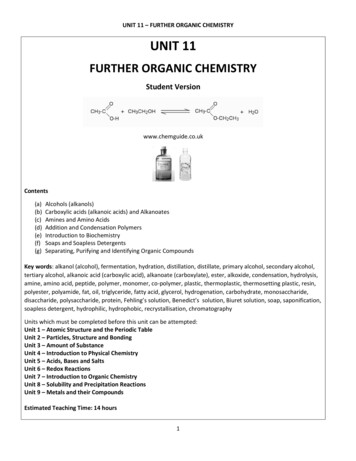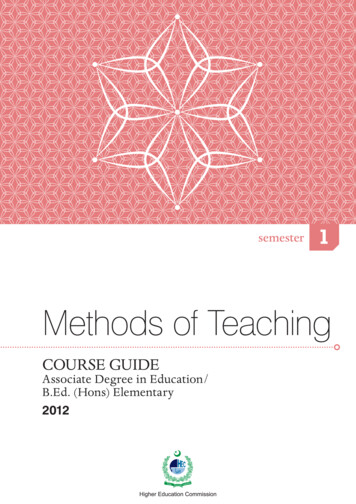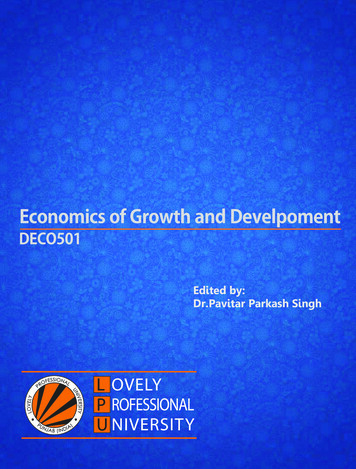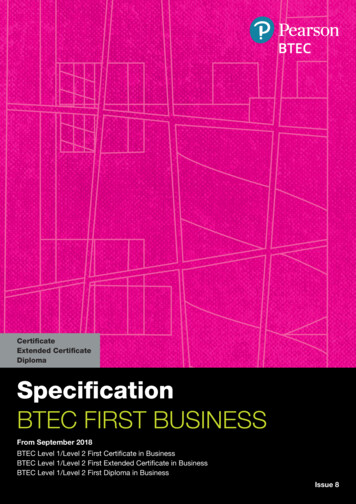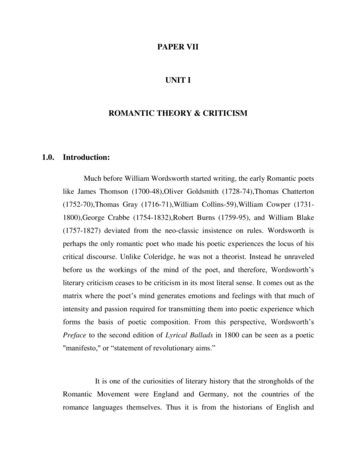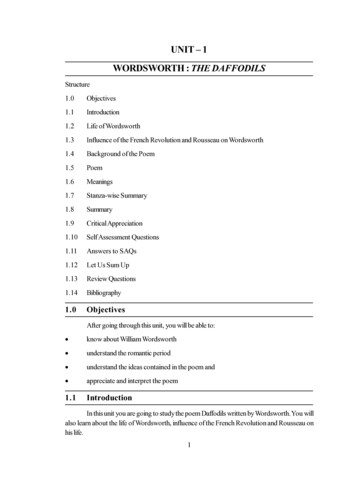
Transcription
UNIT – 1WORDSWORTH : THE ife of Wordsworth1.3Influence of the French Revolution and Rousseau on Wordsworth1.4Background of the Poem1.5Poem1.6Meanings1.7Stanza-wise Summary1.8Summary1.9Critical Appreciation1.10Self Assessment Questions1.11Answers to SAQs1.12Let Us Sum Up1.13Review Questions1.14Bibliography1.0ObjectivesAfter going through this unit, you will be able to: know about William Wordsworth understand the romantic period understand the ideas contained in the poem and appreciate and interpret the poem1.1IntroductionIn this unit you are going to study the poem Daffodils written by Wordsworth. You willalso learn about the life of Wordsworth, influence of the French Revolution and Rousseau onhis life.1
1.2Life of WordsworthWilliam Wordsworth was born on 7th of April, 1770 at Cockermouth. His father JohnWordsworth was an attorney to Lord Londsdale and was an influential man of his time. Hismother Anne Cookson was the only daughter of William Cookson, a well to do mercer adealer in milk products at Penrith and of Dorothy Crackanthrope, whose ancestors had beenlords of the manor of Newbiggin near Penrith. He was second of the five children of hisparents, the others being Richard, Dorothy, John and Christopher. He was educated atHawkshead Grammar School and St. John College, Cambridge from where he did his B.A. in1791. He went to France in 1791 and stayed there for a period of one year. During this timehe was greatly influenced by the French Revolution which was at its peak at that time inFrance. He published his first volume of poems in 1793. In 1795 he got a chance to meet S.T.Coleridge and soon they became life time friends. Wordsworth along with his sister, Dorothyand S.T. Coleridge with his wife were neighbours to each other at Alfoxden and Stowey inSomerset for one year. In 1798, both the poets together published Lyrical Ballads which isconsidered to be an epoch-making collection of lyrical romantic poems whose preface alongwith the poems appearing in it attracted a lot of public attention. Together at the end of thesame year they went to Germany where Wordsworth started writing The Prelude and completed Ruth, Lucy Gray, The Lines on Lucy and some other poems. In 1802, he marriedMary Hutchinson of Penrith. After seven years i.e. in 1805 he completed The Prelude whichwas published after his death on 23rd April 1850. In 1807 he moved to Rydal Mount, Grasmereand lived there till his death. In 1843 he became the Poet Laureate after the death of RobertSouthey.1.3Influence of the French Revolution and Rousseau onWordsworthWordsworth after completing his B.A. in 1791 from St. John College, Cambridgewent to France, in the same year. At that time in France, the French Revolution was at its peak.Wordsworth also felt attracted to it. The aim of the French Revolution was to abolish thekingship and aristocracy and to give full authority to the common man. Rousseau a well knownFrench writer and who is also known as “the father of Romanticism” gave his complete support to this revolution. He also had a deep influence on Wordsworth. Rousseau once said in anargument favouring the French Revolution that man is born free but he is chained everywhere.Time has come now to do away with the kingship and aristocracy. It would be best for the manto give all the powers to the common man. Wordsworth shared the same point of view withRousseau. He supported the purpose of the French Revolution whole-heartedly. He was deeplyattached to the French Revolution. When England prepared herself to fight against Napoleonhe went to Church and prayed there sincerely for the defeat of England, his own motherland.Though later in his life he changed his opinion about the French Revolution and became a2
republican. He retired as the Poet Laureate of England. But throughout his life, he was unableto shed away the influence of the French Revolution and Rousseau on his poetry. From Rousseauand the French Revolution Wordsworth learnt to glorify the life of the common man. He alsolearnt to love and respect nature. The relation between nature and man became the main themeof his poetry. In being the poet of nature, he also became the poet of the common man.1.4Background of the PoemOn April 15, 1802 Wordsworth and his sister Dorothy went to their friends, theClarksons, at Eusemere. When they were coming back to Grasmere, they saw a large numberof golden daffodils growing on the bank of a lake Ullswater in the Lake district. They bothwere astonished by the mesmeric beauty of these daffodils which were fluttering and dancingwith the light breeze. Inspired by this delightful spectacle Wordsworth composed this poem in1804 and published it in 1807.1.5PoemTHE DAFFODILSI wandered lonely as a cloudThat floats on high o’er vales and hills,When all at once I saw a crowd,A host, of golden daffodils;Beside the lake, beneath the trees,Fluttering and dancing in the breeze.Continuous as the stars that shineAnd twinkle on the milky way,They stretched in never-ending lineAlong the margin of a bay :Ten thousand saw I at a glance,Tossing their heads in sprightly danceThe waves beside them danced; but theyout-did the sparkling waves in glee;3
A poet could not but be gay,In such a jocund company :I gazed - and gazed - but little thoughtWhat wealth the show to me had brought.For oft, when on my couch I lieIn vacant or in pensive mood,They flash upon that inward eyeWhich is the bliss of solitude;And then my heart with pleasure fills,And dances with the daffodils.1.6Meanings1.Wander (Verb) : To walk slowly around or to a place, often without any particularsense of purpose or direction.2.Float (Verb) : To move slowly on water or in the air.3.Vale (Noun) : Valley4.Fluttering (Noun) : A quick, light movement.5.Toss (Verb) : To move one’s head this way or that.6.Sprightly (Adjective) : Full of life and energy.7.Outdo (Verb) : Surpass.8.Glee (Noun) : A feeling of happiness.9.Gay (Adjective) : Happy and full of fun.10.Jocund (Adjective) : Cheerful11.Gaze (Verb) : To look steadily at somebody /something for a long time.12.Pensive (Adjective) : Thinking deeply about something, especially because you aresad or worried.13.Bliss (Noun) : Extreme happiness.14.Solitude (Noun) : The state of being alone, especially when you find this pleasant.4
1.7Stanza -wise Summary1.I wandered lonely. dancing in the breeze.The poet is wandering alone from one place to another like a cloud, which flies overvalleys and hills with the flow of wind. Suddenly the poet sees a large number ofgolden daffodils. These daffodils are growing close to the lake and under the trees. Alight breeze is blowing making these daffodils dance and flutter with it.2.Continuous as the star. in sprightly dance.To the poet these daffodils looks like the stars that shine and twinkle in the milky-way.The daffodils are spreading over a very large area along the margin of a bay. They arein an excessively huge quantity. All these daffodils are dancing happily with the wind.3.The waves beside . to me had brought.The waves in the lake beside these daffodils are also dancing with the wind. But incomparison to the daffodils the waves are not as beautiful and attractive. Watchingsuch a beautiful scene the poet feels very happy. The poet continues to look at thedaffodils. The poet prizes the scene greatly for himself.4.For oft. with the daffodilsThe poet says that whenever he lies down on his bed either thinking about anything ornot thinking, the images of daffodils flash upon his imagination. It usually happens onlywhen the poet is all alone. These images of daffodils have a magical effect on the poet.These images fill the heart of the poet with pleasure. The poet also feels like dancingwith the daffodils.1.8SummaryThe poet is alone and having nature in mind wandering from one place to another likea cloud which flies over vales and hills with the wind. All of a sudden he sees a large number ofgolden daffodils which are growing on the bank of the lake under the trees. A light breeze isblowing, making the daffodils flutter and dance with it.For the poet, the view of these beautiful golden daffodils is similar to the stars shiningand twinkling in the milky-way. As far as the poet can see, he finds only the daffodils growingalong the margin of a bay and they seem to the poet to be in very large numbers. All of theseflowers are tossing their heads in a sprightly dance.In the nearby lake, the waves are dancing with the wind and sparkling because of thesun-rays falling on them. But the beauty of the golden daffodils is so attractive and charmingthat it easily surpasses the beauty of the dancing and sparkling waves. The poet feels happyand blessed in such an enchanting and cheerful company. The poet is completely absorbed in5
the beauty of the daffodils and for the moment he has lost touch with his surroundings. Heconsiders himself fortunate and very happy that he has been the witness to such a wonderfulsight of the daffodils.Later, whenever the poet is thinking of not being busy, lying on his couch the daffodilsflash upon his imagination. The memory of the daffodils not only fills his heart with pleasure butalso has a refreshing effect on him and he feels like dancing along with the daffodils.1.9Critical AppreciationWordsworth is mainly a nature poet and for him. there is nothing which is superior toand better than Nature. He breathes through with nature and finds solace and spiritual peace init. In his opinion, nature has the solution for all the problems of mankind. It is through naturethat he seeks salvation. The theme of this poem i.e. “Daffodils” is based on the healing andrefreshing power of nature. How easy it is for nature to lift the spirit and the morale of the manis also depicted in this poem. The poem is rich in imagery and the description of the daffodilsis delightful. The poet starts the poem with the simile and compares himself with the cloudwandering lonely, free from duty and responsibility, here and there like the cloud. But as soonas he sees the beautiful golden daffodils growing along the margin of a bay beneath the trees,dancing and fluttering with the light breeze, he finds himself captivated by their magical beauty.The poet is so impressed by their beauty that the near-by lake whose waves are also dancingand sparkling, thus looking enchanting, also captivate his attention. The poet begins to admirethe mesmeric beauty of the daffodils and is unable to think of anything else. Infact, at that timehe could not think of the great importance of the scene for him but later while lying on his couchhe realizes the very great importance the scene had on him.The last stanza of the poem is the most important part of the poem and is the essenceof the poem. In this stanza, the poet speaks about the healing and refreshing effect of natureand also praises solitude. According to him, when one is in the state of solitude, one becomesretrospective and meditates on all the good and pleasurable moments which one had or whichhad happened to him-in his life. These memories have a cheerful and lively effect on him. Hegreatly feels happy not only with himself but also with all that happened to him. The poet saysthat whenever he lies on his couch having nothing to do or in pensive mood, enjoying thesolitude, the images of the daffodils flash upon his imagination. When this happens, the poetfeels calm, refreshed, motivated and good about himself. This is how nature influences him.The memories of the daffodils fills his heart with pleasure and joy and he feels like dancingalong with the daffodils. This shows the healing and refreshing effect of nature on the poet.1.10 Self Assessment Questions1.What age is known as the “Age of Sensibility ?”.6
.2.Which period is known as the Romantic Period ?.3.Who are the main poets of the Romantic Period ?.4.What was the purpose of the romantic poetry ?.5.What are the main characteristics of the Romantic Period ?.6.Who wrote the Lyrical Ballads and when was it published ?.7.When was this poem written ?.8.When was this poem first published ?.7
.9.What is the theme of this poem ?.10.Where were the daffodils growing ?.11.What are the objects the poet compares with the daffodils?.12.What is the effect of daffodils on the poet ?.13.What is the bliss of solitude according to the poet ?.14.Why does the poet stop on seeing the daffodils ?.1.11 Answers to SAQs1.The later have eighteenth century (1760-1796) is known as the Age of Sensibility. Dr.8
Johnson called is as such.2.The period between 1798 and 1832 is known as the Romantic Period.3.Wordsworth, co;leredge Shelley, Keats and Byron are the mejor poets of the Romantic Period.4.The main purpose of romantic poetry was to express the poetss personal feelings andemotions.5.The main characteristics of the Romantic Period are :1.Love for humaning2.Love and regard for Nature3.Expression of emotions and imagination4.Love for the far off5.Revolt against the hari complete Drydon hope.6.Wordsworth and S.T. Coleridge together wrote the Lyrical Ballads. It was publishedin 1798.7.This poem was written in 1804.8.This poem was first published in 18079.The healing and refreshing effect of Nature is the theme of this poem.10.The Daffodils were growing beside the lake under the trees.11.The poet compares the daffodils with the dancing waves and shining and twinklingstars.12.The daffodils fill the poet’s heart with pleasure and he feels happy with them.13.When the person is in solitude and there is nobody around him. He is all alone. He hasthe opportunity to think of nature. In the poem the poet says that when he is either busythinking or not thinking about any thing he is reminded of the daffodils. He says thatloneliness becomes lovely if he thinks about daffodils in his loneliness. When he remembers the daffodils he starts feeling happy, content and perfectly at peace withhimself. This happens because of solitude.14.The poet stops on seeing the daffodils because never before in his life had he seen suchbeautiful golden daffodils and that too in such a very large number. He is completelyattracted towards them.9
1.12 Let Us Sum UpIn this unit you were able to understand; Wordsworth love for nature, Nature’s healing and soothing effect on man.1.13 Review Questions1.Elucidate the magical effect nature had on William Wordsworth.2.Wordsworth was truly a romantic poet. Explain with suitable example.1.14 Bibliography1.Francis Austin, The Language of Wordsworth and Coleridge (1989)2.Basil Willey, The Eighteenth Century Background (1940)3.Jonathan Wordsworth, Michael C. Jaya, Robert Woof, William Wordsworth and theAge of English Romanticism, (New Brunswick and London, 1987)4.Cazamian, Louis, “The Romantic Period.” A History of English Literature, Part II,Book V,1947.10
UNIT – 2WORDSWORTH :(1) THE SOLITARY REAPER(2) THE WORLD IS TOO MUCH WITH USStructure2.0Objectives2.1Introduction to the Poems2.2The Poem: The Solitary Reaper2.2.1 Glossary2.2.2 Stanza-wise Summary2.2.3 Summary2.2.4 Critical Appreciation2.2.5 Self Assessment Questions2.2.6 Answers to SAQs2.3The Poem: The World is Too Much With Us2.3.1 Glossary2.3.2 Stanza-wise Summary2.3.3 Summary2.3.4 Critical Appreciation2.3.5 Self Assessment Questions2.3.6 Answers to SAQs2.4Let Us Sum Up2.5Review Questions2.6Bibliography2.0ObjectivesAfter going through this unit you will be able to -11
*understand the poems and*appreciate and interpret the poems.2.1IntroductionIn this unit you are going to study the poem “The Solitary Reaper” and ‘The World istoo much with us’written by Wordsworth.‘The Solitary Reaper’ poem was written between 1803 and 1805 and first publishedin 1807. In 1815-1820 it was included among the “Poems of Imagination.” ‘The World is toomuch with us’ was also published in 1807.2.2The Poem : The Solitary ReaperBehold her, single in the field,Yon solitary Highland Lass !Reaping and singing by herself;Stop here, or gently pass !Alone she cuts and binds the grain,And sings a melancholy strain;O listen ! for the vale profoundIs overflowing with the sound.No Nightingale did ever chauntMore welcome notes to weary bandsOf travellers in some shady haunt,Among Arabian sands;A voice so thrilling ne’er was heardIn spring-time from the cuckoo-bird,Breaking the silence of the seasAmong the farthest Hebrides.Will no one tell me what she sings ? –Perhaps the plaintive numbers flow12
For old, unhappy, far-off things,And battles long:Or is it some more humble lay,Familiar matter of to-day ?Some natural sorrow, loss or pain,That has been, and may be again ?Whate’er the theme, the Maiden sangAs if her song could have no ending.I saw her singing at her work,And o’er the sickle bending; –And, as I mounted up the hillThe music in my heart I bore,Long after it was heard no more.2.2.1 Glossary1.Behold (Verb) : To look at or see somebody/ something.2.Solitary (Adjective) : Alone, with no other person or thing around.3.Highland (Adjective) : Connected with an area of land that has hills or mountains.4.Lass (Noun) : A girl, a sweet heart5.Reap (Verb) : To cut and collect a crop.6.Bind (Verb) : To tie somebody / something with a rope or string7.Melancholy (Adjective) : Very sad or making you feel sadness.8.Strain (Noun) : The sound of music being played or sung.9.Vale (Noun) : Valley.10.Profound (Adjective) : Very deep11.Note (Noun) : A single sound of a particular length made by the voice or a musicalinstrument.12.Weary (Adjective) : Very tried13.Band (Noun) : A group of people13
14.Haunt (Noun) : A place that somebody visits often or where they spend a lot of time.15.Hebrides : A cluster of islands to the north-west of Scotland, known as the Northernlimits of the world.16.Plaintive (Adjective) : Sounding sad, especially in a weak complaining way.17.Number (Noun) : A song.18.Maiden (Noun) : A young girl or woman who is not married.19.Sickle (Noun) : A tool with a curved blade and a short handle saythe20.Mount (Verb) : To go up something.2.2.2 Stanza-wise Summary1.Behold her. . with the sound.The poet sees a Highland girl in the field. This girl is reaping the crop and singing toherself. The poet likes this scene. He says to the passers-by either to stop there quietlyor to pass from there without making the least noise. The girl is cutting and binding thecrop alone and also singing a song. This song is of sad nature. But the poet likes it verymuch and wants everybody to listen to it. The song is also echoing in the valley.2.No Nightingale . farthest Hebrides.The poet thinks that even the nightingale famous for its singing to the tired travellers inthe Arabian desert when they take rest at an Oasis, cannot sing better than this girl.The singing of the girl is also better and more thrilling than the Cuckoo-bird which singsin the spring season and then breaks the silence of the seas among the faraway Hebrides.3.Will no one tell . may be again ?The poet is unable to understand the language in which the girl is singing. He does notknow the theme of the song and wants somebody to tell him the theme. He thinks thatthe song is about old, unhappy incidents or of some battles in the past. The song canalso be about some familiar matter related to the life of the girl. The song may also beabout some natural sorrow, pain or loss which has happened to her.4.Whate’er the theme . heard no more.The poet does not think too much about the theme of the song. He is enjoying the songheartily. The poet thinks that there is no end to the girl’s singing as if she will never stopsinging. He watches her singing and using the sickle to do her work at the same time inthe field. The poet says that he listened to her song without making any kind of movement and noise. When the poet went up the hill he says that, he still remembered themusic of the song which that highland girl sang. The poet also says that he will always14
remember her singing.2.2.3 SummaryThe poet is wandering aimlessly on his way when suddenly sees a highland girl alone inthe field. The girl is reaping the crop and singing a song to herself. The poet likes her singingvery much. He tells the people passing from there not to disturb her in her singing. He wants thepeople to stop where they are or to pass from there very quietly. There is nobody with the girland she is cutting and binding the grain all alone. The poet observes that the song which she issinging is full of sorrow and melancholy. The girl is standing in the valley and her song isresounding through the deep valley.The poet feels that the girl’s song is very sweet. He finds her song sweeter than thesong of the nightingale. The poet says that the nightingale’s song gives relief and happiness tothe travellers in the Arabian deserts when they stayed on Oasis. The poet feels the girl’s songis thrilling also. He says that he has never listened to a more thrilling song than this. He evenfinds the girl’s song more thrilling than the song of the cuckoo bird. The cuckoo bird sings hersongs in spring time over the silent seas of the faraway Hebrides.The problem with the poet is that he is unable to understand the girl’s song. He doesnot know the language in which she is singing. He wants somebody to tell him the meaning ofthe song. But there is nobody around to tell him. Therefore, the poet himself begun to guess themeaning or theme of the song. According to him, the song may be about some old, unhappyincidents or of battles of the past. It may also be about a matter familiar to the girl. It can alsobe about some natural sorrow, loss or pain which has happened to her in the past.The poet is unable to know the theme of the girl’s song. But he is not worried about it.He is still enjoying the song. It seems to the poet that the girl will not stop singing. Her song willnever end. She will continue to sing forever. The poet watches the girl singing and doing herwork. He stands there without making any kind of movement. He also listens to her songwithout making any kind of noise. He does not want to disturb the girl. When the poet went upthe hill, he could not hear the girl’s song. But the poet says that he can still hear the sweetnessand melody of the song in his memory. He is sure that he will never forget it.2.2.4 Critical appreciationIn this poem Wordsworth has beautifully described the life in a countryside, a girlcutting the crop while singing. He has used the language of the common man to describe thecountry life. The poet sees a highland girl working alone in the field, reaping the crop andsinging a melancholy song to herself. The poet immediately feels attracted towards this beautiful song. Although he is unable to understand the language of the song but even then he isenjoying the music of the song. The poet loves the girl’s singing so much that he compares itwith that of a nightingale and a cuckoo bird. Both these birds are well known for their singing15
abilities but the poet thinks that the girl was singing sweeter and better than these two birds. Hedoes not want to disturb the girl in her singing. He says to the passers - by either to stop thereor to pass away from there without making any kind of disturbance. He himself is listening tothe song silently while standing still. As the poet is not sure of the theme of the song, he imaginesthat the song could be about some old, unhappy incidents or about the battles of the past. Thesong could also be about some familiar matter related to the girl’s life, or it could also berelated to some natural sorrow, loss or pain which must have happened to the girl before. Thisshows the love of past which is a characteristics feature of the romantic poetry. For the poet toenjoy the music of the song is more important than knowing the theme of the song. He is notconcerned about the theme. It seems to him that there is no end of the girl’s singing and she willcontinue to sing forever. At the end of the poem, the poet says that he knows he will not get achance to listen to this song again. But even then he will remember her singing. It is impossiblefor him to forget that singing. He will always remember it.2.2.5 Self Assessment Questions1.When was this poem first published ?.2.When was this poem written ?.3.What is the theme of this poem ?.4.What are the other things with which the poet compares the solitary girl’s singing andwhy does he do so?.5.According to the poet what can be the theme of the girls singing ?16
to shed away the influence of the French Revolution and Rousseau on his poetry. From Rousseau and the French Revolution Wordsworth learnt to glorify the life of the common man. He also learnt to love and respect nature. The relation between nature and






